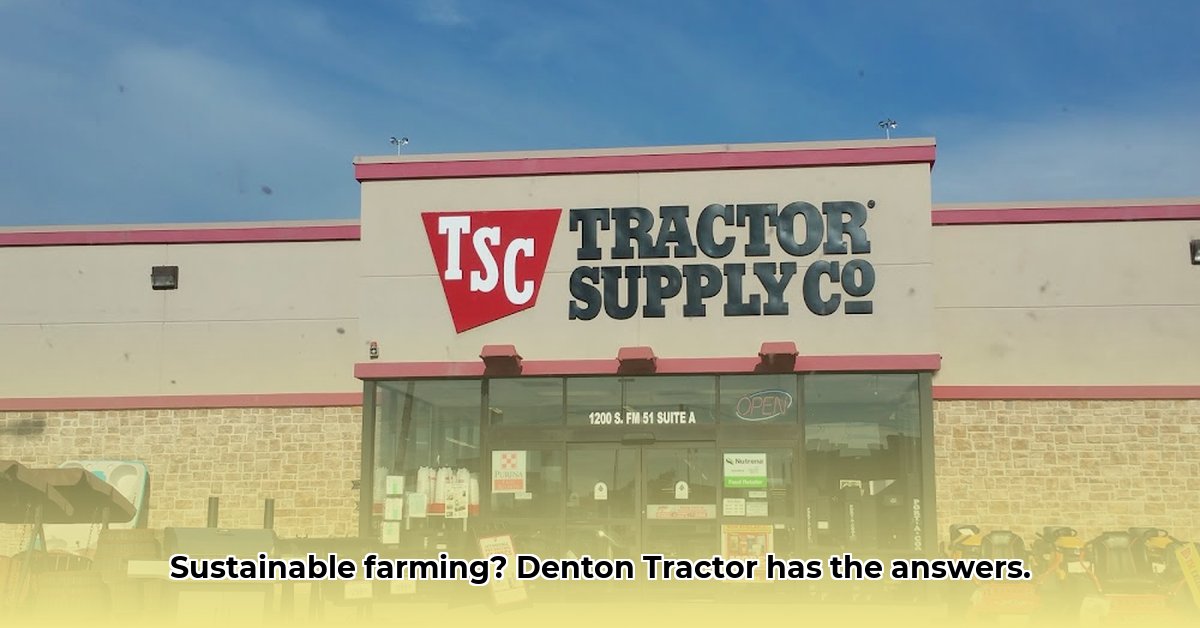
Denton Tractor Supply (DTS) plays a vital role in the Denton County agricultural landscape, serving as a key supplier for farmers and ranchers. This case study examines DTS's effectiveness in supporting sustainable agricultural practices, focusing on accessibility, inventory, operating hours, and community engagement. The study's findings highlight opportunities for improvement and propose actionable steps for stakeholders to strengthen local support for sustainable agriculture.
Accessibility and Convenience: A Farmer-Friendly Location?
DTS benefits from a convenient location, easily accessible via major highways (I-35E and US-77), a significant advantage for farmers often transporting equipment. The ample parking lot facilitates maneuvering larger vehicles. Its proximity to both rural and urban areas suggests a broader potential reach. However, convenient location alone doesn't guarantee sufficient support for sustainable agriculture. Further investigation is needed to understand if the store's accessibility translates to meeting the specific needs of sustainable farmers.
Inventory: Stocking the Shelves for Sustainable Farming
A comprehensive evaluation of DTS's inventory is crucial to assessing its support for sustainable agriculture. Does the store adequately stock products essential for eco-conscious farming? This includes organic seeds, water-saving irrigation systems, compost solutions, and environmentally friendly pest control. Current information is limited, requiring further research to determine the adequacy of sustainable options compared to conventional offerings.
A preliminary product inventory assessment reveals the following (further research required):
| Product Category | Conventional Options Available? | Sustainable Options Available? | Notes |
|---|---|---|---|
| Fertilizers | Yes | Partially available | Further investigation needed on the range and availability of organic and biodynamic fertilizers. |
| Seeds | Yes | Partially available | Variety and availability of organic and heirloom seeds require assessment. |
| Irrigation Equipment | Yes | Partially available | Availability of drip irrigation systems and other water-efficient technologies needs clarification. |
| Pest & Disease Control | Yes | Partially available | Availability of biological and integrated pest management solutions needs further analysis. |
Do these limited sustainable options sufficiently meet the needs of local eco-conscious farmers? This lack of readily available data requires more direct investigation.
Operational Hours: Making Time for Farmers
DTS's operating hours significantly impact accessibility for farmers, many of whom work irregular hours dictated by seasonal demands. Detailed daily and seasonal operational hours are needed to assess whether current hours adequately accommodate farmers' schedules, especially during peak planting and harvest seasons. Extended hours during peak agricultural periods might be necessary to improve accessibility. Further research, potentially including farmer surveys, is needed to fully understand these access needs.
Community Engagement: Building Bridges
Strong community engagement is vital for effective support of sustainable agriculture. Current information on DTS's community initiatives is unavailable. Therefore, we must investigate the extent to which DTS engages with local farmers and sustainable agriculture organizations. Exploring potential collaborations, such as workshops or demonstration days featuring sustainable farming techniques, would foster a more supportive environment. This collaboration could strengthen local food systems and the overall health of the Denton County community. How can partnerships be leveraged for mutual benefit? This is a key question for future research.
Case Study Findings and Conclusions
This case study reveals a mixed picture of Denton Tractor Supply's role in supporting sustainable agriculture. While the store's convenient location and wide range of conventional products are advantageous, its inventory of sustainable options, operating hours and community engagement require enhancement. Further research is needed to fully assess the extent to which the store meets the specific needs of sustainable farmers.
Recommendations and Actionable Insights
Improving DTS's support for sustainable agriculture requires collaborative efforts:
Denton Tractor Supply: Conduct a thorough inventory analysis, expand sustainable product offerings based on farmer needs, and partner with local sustainable agriculture organizations to host workshops and educational events.
Local Farmers and Ranchers: Communicate needs and preferences to DTS, consider collaborative bulk buying for cost savings, and offer feedback on product availability.
Denton County Officials: Promote DTS as a sustainable agriculture resource and explore policies incentivizing sustainable farming practices.
Sustainable Agriculture Groups: Collaborate with DTS for educational programs and research to identify product gaps.
This multifaceted approach strengthens DTS's role and supports the long-term health of Denton County's sustainable agriculture sector.
Conclusion
Denton Tractor Supply's contribution to supporting sustainable agriculture in Denton County is significant but can be improved. The findings highlight the crucial need for enhanced inventory, optimized operational hours, and stronger community partnerships. Further research, including farmer surveys and detailed inventory assessments, is crucial for a comprehensive understanding and improved support for sustainable agricultural practices. The role of rural retail in bolstering local food systems and environmentally friendly farming is vital, and continued evaluation is essential to ensure effective resource allocation.